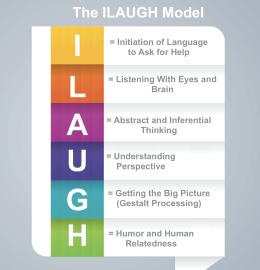Conceptual & Treatment Frameworks
Conceptual Frameworks are built upon research-based theoretical concepts, constructs, and therapies in a manner that blends or scaffolds the information to help parents and professionals organize their thinking about social learning (social cognition).
Treatment Frameworks evolve from the conceptual frameworks and transform evidence-based concepts into a concrete and structured framework that can be introduced to and used with students. Treatment frameworks were designed for Interventionists (educators, therapists, and parent/caregivers) to first understand and then utilize that knowledge to structure teaching for clients, students, and individuals with social learning challenges.
To truly understand the richness of the evidence base underlying the frameworks, strategies, activities, and motivational developmental tools of the Social Thinking Methodology, the Treatment Frameworks listed below have a direct link to the Conceptual Frameworks.
These frameworks serve two missions: 1) Provide the Interventionist with a deeper understanding of the theoretical concepts and 2) Create a structure for our clients/students to understand that the strategies we teach do not stand alone, but are part of a larger social process.












